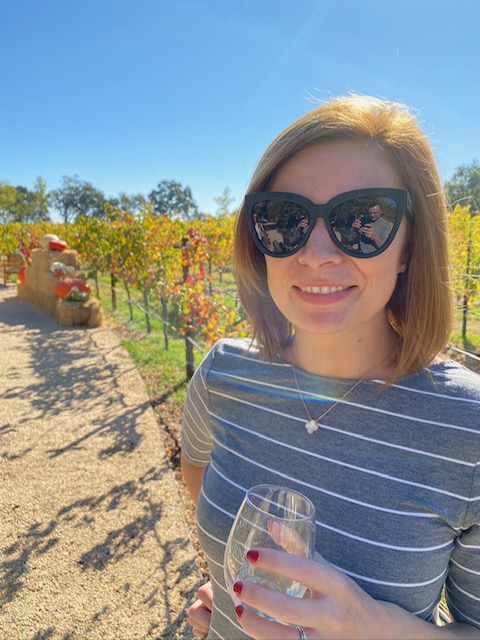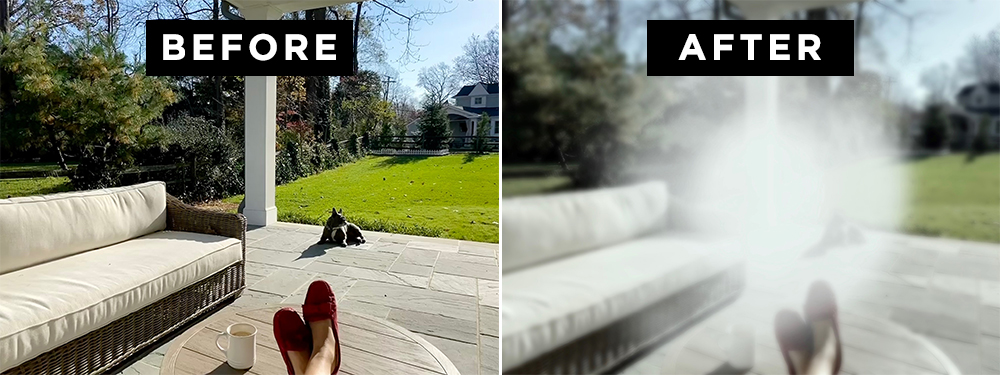Apr. 19, 2021
By Kyle Trompeter, Content and Corporate Communications Manager, Breakthru Beverage Group
For most people, waking up every day and clearly seeing the world in front of us is a luxury we likely don’t imagine we will ever lose.
But for Megan Davidson, the gift of sight vanished in a matter of months.
“When I first learned of my extremely rare disorder, I remember being terrified,” said Davidson, Project Manager, Master Data Management, Breakthru Beverage Group.
Her disorder is called Leber’s Hereditary Optic Neuropathy (LHON), and it causes sudden, painless, severe central-vision loss to both eyes due to deterioration of the optic nerves. It’s a gene mutation Davidson was unaware she had until her eyesight started to go due to a triggering environmental event in 2018. This unfortunately started a rapidly moving clock that would drastically downgrade Davidson’s sight from completely normal to a deep, dense fog — permanently.
Davidson immediately worried what this would mean for her career. According to the National Federation of the Blind, approximately 80 percent of adults in the U.S. with severe vision loss are unemployed, and now she found herself on the brink of becoming a statistic.
But losing her career along with her sight wasn’t going to be the way her story would be written.

I love my job, and I am good at my job,” Davidson said to herself at the time. “I am going to push that statistic down.
- Megan Davidson

In short order, Davidson had to learn how to do her job without being able to see. If she wanted to be able to avoid becoming a statistic, she was required to complete a series of intensive and immersive learning sessions to be able to use accessibility software that she would need to continue her career, and that’s exactly what she did.
In the blind community, there is a saying: sight is a function of the eyes, but vision is a function of the heart. The saying feels like it perfectly captures Davidson’s story, as she has never lost her vision for who she is, and what she is capable of.
And what she is, to Breakthru, is a standout associate, who not only continues to execute her role at a high level despite her visual impairment, but more importantly, she embodies a level of courage and passion that we should all strive towards.
Q&A with Megan Davidson

What was your first role at BBG, and what were your responsibilities?
Megan Davidson: Ten years ago, I started with the Charmer Sunbelt Group in the New York office as a coordinator for our EVP of Sales at the time, Bob Catalani, and his business development team. I was responsible for both enterprise-level and supplier-specific performance reporting.
What is your current role and responsibilities?
I’m a Project Manager on our Master Data Management team, which is led by Mark Chakar and part of our broader Commercial Excellence team under Chad Stone. In my current role, I manage cross-functional projects that deliver against Breakthru’s data quality and continuous-improvement agenda for both corporate and local markets.
Can you describe your visual impairment?
I have a central blind spot in both of my eyes that looks like a deep, dense fog. It feels like I am underwater. I can’t read standard text and I can’t see faces. Also, I have complete color confusion except when it comes to blue.

I have enough peripheral vision where I do not need to use a cane on a regular basis. However, I do use my white cane occasionally when maneuvering through airports, banks, restaurants, grocery stores, and other areas I am not familiar with. I mainly use the cane as an indicator to others that I have low vision so people aren’t confused if I come to them with a question or ask for help, as I often hear the comment, “You don’t look blind!” Interestingly, only five percent of visually impaired people use a guide dog, and less than 10 percent use a cane.
There is currently no cure to LHON; however, I am a participant in the gene therapy trial at Bascom Palmer Eye Institute in Miami. I am one of the first humans to be injected with this treatment. Although I may not fully benefit from this procedure, my contribution may very well help future carriers of this gene mutation and prevent others from joining the legally blind club.
When you learned you were going to be visually impaired in short order, how did you approach your managers at Breakthru?
I had to approach my management and not only tell them exactly what my fate would be, but that I needed a computer that was beefed up in order to support the software I required, which includes screen zooming to an extreme amount (for me it is usually 1200 percent) and a reader that vocalizes everything you are scrolling through.
Knowing my management as well as I do, I could tell they were in as much shock as I was in regard to my diagnosis, but they didn’t hesitate to approve the hardware.
My advice for anyone, disabled or not, be upfront and ask for what you need to succeed at your role.
How did you learn to adapt your skills when you started losing your vision? Who helped you?
Have you ever gotten thrown into water completely unexpected? Yeah, that was me for a solid three months. I had to grasp at straws to learn the accessibility software.
I first conquered voice over on my iPhone. I was able to listen to all emails and prep myself for upcoming calls without stressing myself, straining my eyes, and feeling incompetent for not being able to read the text. I remember thinking I wish I knew this was available to me when I was fully sighted, because listening to long emails instead of reading allows folks who absorb info better audibly to take it in — life changing!
My next step was to go through the Commission of the Blind in California, which is where I was living at the time. I had an instructor come to my house after the workday wrapped up, and we had three-hour sessions in the evenings. He was fully blind, and completely relied on his cane. He was hardcore — he took away my monitor and made me fully function based on keystrokes and the accessibility software’s voice over.
Describe how your visual impairment has affected your ability to do your job?
As long as the tools I am using are compatible to my accessibility software, it doesn’t. If anything, this visual downturn has given me the benefit of having to utilize enhanced problem-solving skills.
What would you want people, including your coworkers, to know about people like you who have a visual impairment?
Please don’t place assumptions or judgement on visually impaired people. Blindness is truly a spectrum. It isn’t all or nothing.
When I was newly affected, I did not yet have my white cane, and needed to be a part of the group that boarded a flight prior to those with airline loyalty, as I cannot see the seat numbers without taking my time, and using the camera on my phone to zoom. Someone who was in line waiting to board while I was working with the desk agent shouted, “She doesn’t look disabled, how are you going to allow her to board before those in the 1K line?!” The desk agent obviously has dealt with this before and quickly replied, “Do you want to ask her what her disability is?” This ended the conversation.
When I finally got the guts to go to the DMV to have my driver’s license downgraded to a non-driver ID, I had my white cane in hand and my husband beside me and the clerk asked, “Are you doing this because you lost your license due to a DUI?” I had to quickly respond and say, “I am legally blind, I will never be able to drive again.”
We all have a gripe in our lives at whatever point in time and your complaint may be a true blessing to someone else. Please try not to complain about something that someone may find to be a joy to be able to accomplish without assistance. As I said before, I’m never going to drive again. Going to the grocery is a true nightmare for me, so that errand is assigned elsewhere. One time last year, I put cocktail sauce on a hot dog, mistaking it for relish, and the amount of clear glasses I break on a regular basis is through the roof. I can laugh at some of these things now, but they are definitely a tough pill to swallow.
What are some of the BBG projects you have worked on that you are most proud of and why?
For five years, I was a key chair on the Wine & Wishes committee, which managed planning and implementation of the annual charity auction and tasting hosted by The Charmer Sunbelt Group in Manhattan to benefit the Make-A-Wish foundation.
Also, I am one of the initial members of the Data Governance Team, which was an uncharted area of focus. Our team has tackled data quality and solidarity across various functional areas of our organization. I love being involved in the effort for the future good of our data quality. It is one thing to point out the aspects of our intellectual assets that are incorrect but to be involved in the team that promotes course correction affords a great feeling of accomplishment.
What is your favorite part of our industry?
I love that with the three-tier system, we put the trucks on the road to our customers, as well as this being a family owned business. I really appreciate the one-on-one connection we make with our customers, as it reminds me of my father’s family, who owned a dairy farm that had a dedicated delivery system like ours. Even with the latest evolutions in our industry, like eCommerce, I appreciate that these innovations work within the established fabric of the three-tier system. It’s still a relationship-driven industry, and that’s what I really like about it.